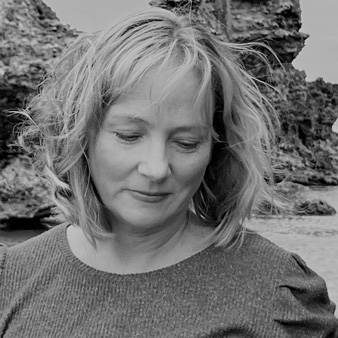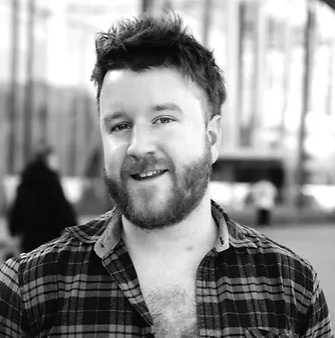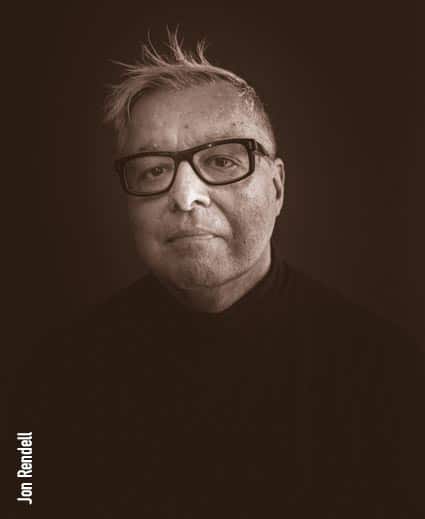Interview
Kate Hall & Timothy Ryan
in conversation with Dmetri Kakmi about Queer Victorian Festival of Words
Good things can spring from disappointment. Author and academic Kate Hall and I began talking about organising a queer writers’ festival after we were dropped from a Melbourne suburbs writers’ festival because, the programming director felt, there was no interest in a session about gothic queer writing. Kate was so enthused by the idea, she quickly brought in performance artist Timothy Ryan.
I dropped out due to persistent ill health and overcommitment, and then watched in admiration as these two champions pulled together a program, seemingly out of thin air, in Melbourne and five regional centres. I caught up with them as they were building up to two major events in Geelong and Warrnambool.
The Interview


DMETRI KAKMI:
Where did the idea for the Q-Lit Festival come from? Is there a need, given the many literary festivals and events in Melbourne?
KATE HALL:
There are, indeed, many wonderful literary festivals and events in Melbourne and in regional Victoria, but nothing state-wide, which focuses solely on amplifying the voices of queer writers and readers. Q-Lit aims to connect existing LGBTQIA+ and writing communities, to build these communities in regional parts of the state, and to offer regional readers and writers the opportunity to attend literary festival events without having to travel long distances. We also hope to antagonise the perception that the city is the locus of culture by showcasing the brilliance of queer wordsmiths across Victoria.
TIMOTHY RYAN:
LGBTQIA+ culture has a long history in the use of language. As a community, queer people have developed coded language for finding one another in repressed times, used stories as a way of exploring and coming to terms with gender and sexuality, and redefined words of oppression into words of empowerment. Victoria’s newest literature festival aims to celebrate this unique history.
TIMOTHY and KATE:
We acknowledge the wonderful work which existing LGBTQIA+ festivals do. Midsumma, for example, does great work for the queer arts community as a whole, but we focus on writers and creatives who use words as their primary form of creativity. Writers are often quiet creators, working behind the scenes, so to speak, and so Q-Lit is quite specific in its aim to bring writers out and give them a chance to be seen and heard alongside their more performative fellow creatives.
DK:
How did you go about getting the festival off the ground?
KH:
Timothy and I met when Timothy asked me to be part of a photography exhibition he was putting together. This exhibition, Camp, celebrated the work of queer regional creatives across Victoria. I felt an immediate connection with Timothy, and admired his vision to create visibility and inclusion for regional artists and writers. He was the obvious choice when I was thinking of possible collaborators for the festival idea. Timothy has his own theatre company, Scratch Arts, and this has been a fantastic parent organisation for Q-Lit, allowing us to access different forms of in-kind support, connections and expertise.
We applied for four mid-sized grants, and were successful in securing two of four. With letters of support from high profile authors, publishers, booksellers, libraries and LGBTQIA+ organisations behind us, we were lucky enough to receive funding from Midsumma/Victoria’s Pride and the Department of Families, Fairness and Housing. This combined funding allowed us to provide travel, accommodation and modest speaker’s fees for our authors and presenters, plus the logistics – venue hire, equipment and so on.
We are immensely grateful to the Village Festival, a queer arts organisation with which Timothy works, for auspicing our festival. Regional libraries have been an absolute gift – the generosity of the people who work in our regional libraries is both delightful and astonishing. Libraries have provided in-kind support in the form of spaces to hold our events, catering, promotions, bookings and additional financial support. Some of the libraries opened up especially for us, and brought staff in on a Sunday to assist in the smooth running of events. Quite simply, Q-Lit could not have happened without the libraries who hosted us.
We are also tremendously grateful to Rowland at Hares and Hyenas for being our official bookseller and going out of his way to help us by providing copies of all our authors’ books, plus a range of queer literature to sell at events.
Our deepest thanks go to our participating writers, and all the people and organisations, including publishers, other queer organisations, bookshops and local businesses who have reached out to us and supported us in various ways.
DK:
What are your primary aims?
TR:
To encourage the community to come together, to strengthen, amplify and connect the queer writing community. At each of our festival events, in between workshops and showcases, the writers, organisers and volunteers have found ourselves sharing our own personal stories with one another. In creating safe spaces for queer writers to share their stories with the broader community, we are also connecting to and strengthening our own community.
KH:
Q-Lit is about celebrating our voices and creating the conditions for the writing, sharing and publishing of more queer stories. Although there are positive changes in many parts of the world, queer stories continue to be marginalised and erased by mainstream culture. One of the best ways to counter that is to increase our visibility and our output. In encouraging unpublished and emerging queer writers to think of themselves as writers, we hope the festival will empower more writers to finish their stories and get them out in the world.
DK:
Tell us a bit about yourselves.
KH:
I’m an author and academic, with a background in literary studies. My debut novel, From Darkness, was published in 2020 by Duet Books, New York. This book was my first real attempt at creative writing, and though it was amazing to be published internationally, I could not find an Australian publisher. So I feel as though I missed out on being part of the Australian writing community as a result. I have no previous experience of organising literary festivals or event planning of any kind. When I started this festival with Timothy, I knew very few people in the queer arts community. Now, through the festival, I feel like I am part of the community I hoped to build, and that is a very good feeling.
TR:
I started my artistic career studying acting and immersive theatre at the University of Ballarat. From there I moved to North Melbourne to open Scratch Warehouse. For two years I ran Scratch Warehouse as a space for Melbourne’s artistic community with thirty artist studios, a gallery, a theatre and a 400 person capacity event space. For the last few years I’ve been developing contemporary, absurd and joyous works that span across children’s theatre, immersive theatre, circus and comedy.
DK:
Once you received the funding, how did you go about putting together a program?
KH:
Timothy and I both knew a few queer writers, including those who had so generously written letters of support for our grant applications, and so we started there. For example, Sarah Hart, a multi-disciplinary creative from Ballarat, is the former Arts and Literature Director of Frolic Festival. We reached out to Sarah to see if she wanted to be involved and if she knew other local Ballarat writers and wordish creators who might like to come on board.
Sarah introduced us to Djab Wurrung and Gunditjmara writer and activist, Sissy Austin, who opened our evening showcase in Ballarat. Sarah, Sissy and Benjamin Ashe, Co-Director of Frolic, plus the wonderful library staff at the Sebastopol Library, then began to spread the word in Ballarat, and helped with promotions.
This was vital, as we had a very short lead-time between November and January to organise our first event. And that’s how we’ve been programming since – asking people who know people to ask people – it’s very much a community thing. We also have an EOI page on our website, and in our first month we received over a hundred EOIs. We worked our way through those, but still did not manage to include everybody. Next year, we hope to secure more funding and be able to program more writers.
DK:
One of the commendable things about the festival is that it encompasses rural Victoria. What’s the thinking behind that?
TIMOTHY and KATE:
We wanted to blur the lines between metro and regional. We knew it was important to help improve levels of safety and belonging in regional areas so that queer people from those areas don’t feel like they have to move to a metro area to feel safe.
Generally speaking, there is more homophobia in regional areas, so our presence, supported by the libraries and councils, aims to reduce homophobia and show non-queer folks what we are about. For young queer and questioning people in regional areas, our aim is to give them a taste of the queer world which is not available via the internet – the world of writers’ festivals, and the chance to participate in writing workshops with established writers.
DK:
Did you seek writers from those areas or are you importing writers from greater Melbourne?
KH:
Both! It is important that we break the mould in as many ways as we can. This means resisting the idea that Naarm/Melbourne is the cultural hub of Victoria. Regional towns and cities are brimful of talent and creativity; in fact, writers often choose to live in regional areas to nourish their creative energies. The trick has been to lure regional writers out, and we have done that as much as we can, while aiming to balance our programming by bringing writers from greater Melbourne to the regions.
Some of our metro writers had never travelled to the regional areas where our events were held, and so there’s a two-way mode of connection here. We reject the idea that literary festivals must adhere to the old ‘sage on the stage’ model whereby a famous writer talks and others listen. By programming unpublished and emerging writers alongside established authors we unsettle the hierarchical structure of traditional writers’ festivals.
By finding writers who live in the areas where we hold our regional events and introducing writers from different parts of Victoria to one another, we aim to build this vast, state-wide web of queer literary connections, including writers working in all genres and modes, from hobbyists to established authors, and from as many diverse backgrounds as possible.
DK:
I know inclusivity and diversity is a large part of your agenda. Did you have trouble finding queer writers from the various groups you wish to represent?
TIMOTHY and KATE:
We did wonder, at first, how to go about looping in writers from as many existing diverse communities as we could, and we are not quite there yet. We would love to have a heap more Koori creatives, and also people from refugee and asylum seeker communities across Victoria. We would like to connect with Rainbow Families, Minus18 and other youth-focused organisations.
As we grow, we are finding that people are starting to reach out to us. Wonderful folks like Dr Maria Pallotta-Chiarolli AM from the Australian LGBTQ Multicultural Council (AGMC), Fleassy Malay, who heads the feminist poetry collective, Mothertongue, Urszula Dawkins and Alex Nichols from A Thousand Threads Press, a new indie publisher of two anthologies of trans and gender diverse life-writing, and many others.
We acknowledge and respect the boundaries of queer groups and collectives who experience multiple intersectional forms of oppression and who co-constitute identity based on culture and community in different ways to those that we, as white settler Australians do. We hope to continue to invite, but never impose, collaboration across all of our diverse queer communities, and to find new ways of working together. As editor Michael Earp wrote on the title page of the copy of Kindred I bought for my daughter, ‘we are all kin’.
DK:
What do you hope to achieve at the end of your first outing?
TIMOTHY and KATE:
We hope that our Q-Lit community has done what we set out to do, namely, to offer increased opportunities for queer folks who work with words to share those words with each other, to meet one another, and to feel emboldened to tell their stories, in their own words, and in their own ways.
We had wonderful feedback about the impact we are making. From the trans writer living in a regional area who told her publisher how empowering it was to be able to read her work in a safe space, to the young poets who travelled a long way by train to take part in our daytime workshops and then felt brave enough to read their work at our showcase that same evening, our festival is helping people to share their words and to claim their writerly identities.
We have provided promotional opportunities for authors who had new or recently released books during our festival season, and hopefully this has increased their reach. And we have made lots of new friends, including writers of historical fiction, memoir, poetry, songwriters, children’s authors, editors, academics and more. Our community is growing and becoming stronger with each festival event.
That, for us, is a significant achievement. We are proud of our fledgling festival, and look forward to seeing it flourish in the years to come.
Dmetri Kakmi is a co-editor of Kalliope X. He is the author of The Door and Other Uncanny Tales, Mother Land, When We Were Young (as editor), and the forthcoming Haven: Letter to an Unknown Father.

